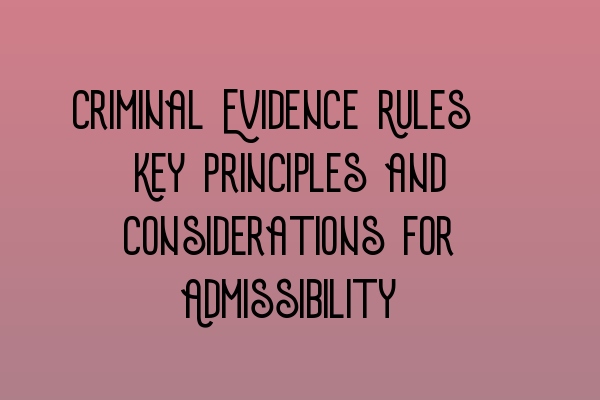Criminal Evidence Rules: Key Principles and Considerations for Admissibility
When it comes to criminal law cases, one of the crucial aspects that can make or break a case is the admissibility of evidence. The rules surrounding criminal evidence exist to ensure fairness, accuracy, and integrity in the criminal justice system. In this article, we will delve into the key principles and considerations for admissibility of evidence in criminal law cases.
Relevance
One of the fundamental principles of admissibility is relevance. Evidence presented in court must be relevant to the case at hand. It should have a logical connection to the facts under investigation and should help the court in reaching a just decision. Irrelevant evidence may be excluded, as it can mislead the court and waste valuable time.
Reliability and Authenticity
Another crucial consideration is the reliability and authenticity of the evidence. The court needs to have confidence in the accuracy and trustworthiness of the evidence presented. The reliability of evidence can be influenced by factors such as the source of evidence, the manner in which it was obtained, and any potential issues of tampering or contamination. Authenticity ensures that the evidence is what it purports to be and has not been altered or manipulated.
Hearsay and Exceptions
Hearsay is an important concept in criminal evidence law. It refers to an out-of-court statement offered for the truth of the matter asserted. Generally, hearsay evidence is inadmissible unless it falls within an exception. There are several recognized exceptions, such as statements made by a person who is unavailable to testify due to death or incapacity, statements made in the course of medical treatment, and business records. Understanding the exceptions to the hearsay rule is essential in determining the admissibility of evidence.
Character Evidence
Character evidence relates to the moral traits or character of a person involved in a criminal case. In general, character evidence is inadmissible for the purpose of proving the conduct in question. However, there are exceptions when character evidence becomes relevant, such as in cases of self-defense or when the character of a witness is being attacked. It is important to understand these exceptions and their implications for the admissibility of evidence.
Expert Opinion
In complex criminal cases, expert opinions can play a significant role. Expert witnesses possess specialized knowledge, skill, or experience in a particular field and can provide opinions based on that expertise. However, their opinions must meet certain criteria to be admissible, including relevance, reliability, and the absence of any potential prejudice. The court has the discretion to allow or exclude expert opinion evidence based on these considerations.
Conclusion
Admissibility of evidence is a critical aspect of criminal law cases. Understanding the key principles and considerations discussed in this article is essential for both prosecutors and defense attorneys. By ensuring evidence is relevant, reliable, and authentic, and by navigating the rules surrounding hearsay, character evidence, and expert opinions, legal professionals can strengthen their cases and contribute to the fairness and integrity of the criminal justice system.
For further information on preparing for the SQE exams, including practice exam questions and preparation courses, please visit our related articles:
- SQE 1 Practice Exam Questions
- SQE 1 Practice Mocks FLK1 FLK2
- SQE 2 Preparation Courses
- SQE 1 Preparation Courses
- SRA SQE Exam Dates
